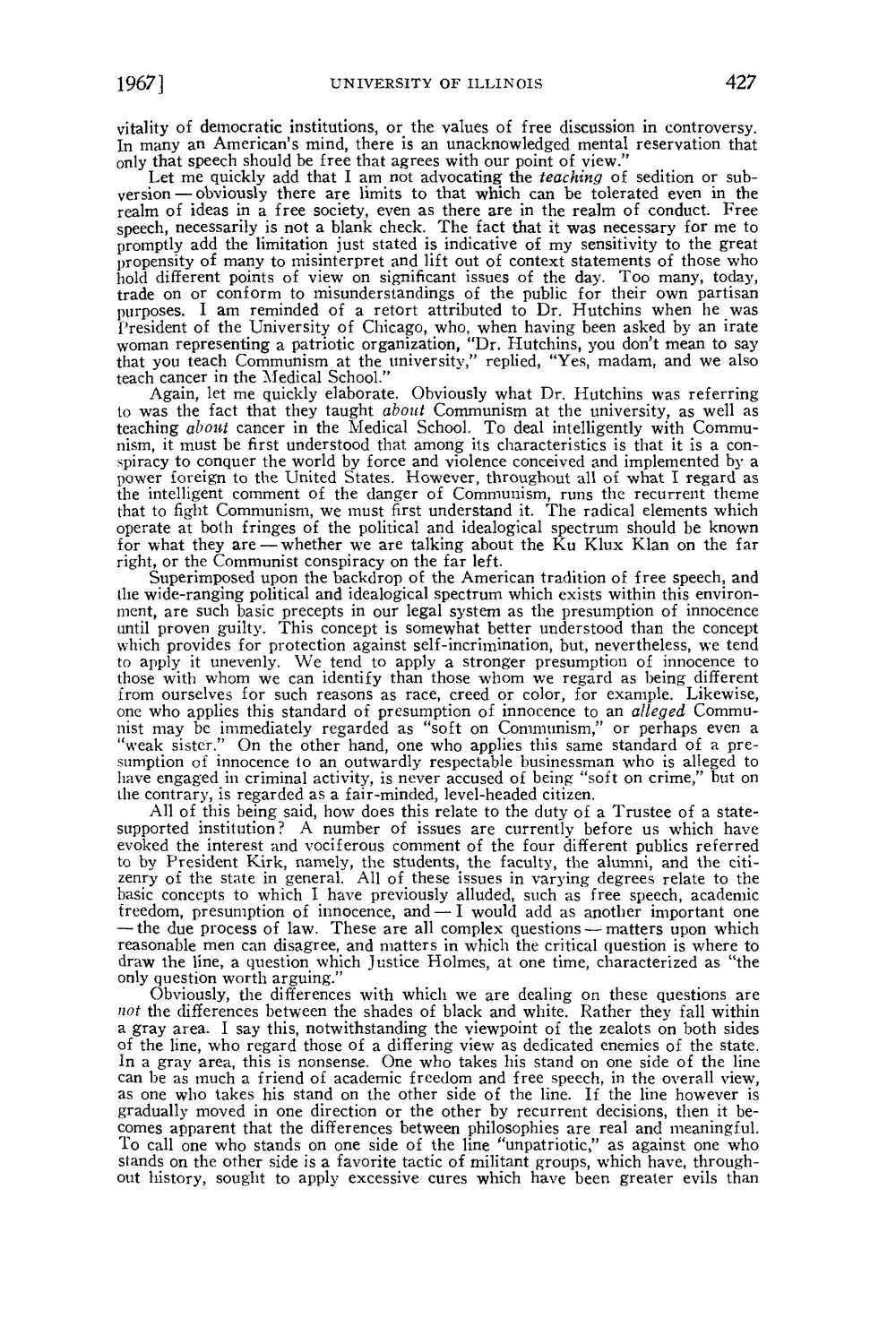| |
| |
Caption: Board of Trustees Minutes - 1968
This is a reduced-resolution page image for fast online browsing.

EXTRACTED TEXT FROM PAGE:
1967] U N I V E R S I T Y OF I L L I N O I S 427 vitality of democratic institutions, or the values of free discussion in controversy. In many an American's mind, there is an unacknowledged mental reservation that only that speech should be free that agrees with our point of view." Let me quickly add that I am not advocating the teaching of sedition or subversion— obviously there are limits to that which can be tolerated even in the realm of ideas in a free society, even as there are in the realm of conduct. Free speech, necessarily is not a blank check. T h e fact that it was necessary for me to promptly add the limitation just stated is indicative of my sensitivity to the great propensity of many to misinterpret and lift out of context statements of those who hold different points of view on significant issues of the day. Too many, today, trade on or conform to misunderstandings of the public for their own partisan purposes. I am reminded of a retort attributed to Dr. Hutchins when he was President of the University of Chicago, who, when having been asked by an irate woman representing a patriotic organization, "Dr. Hutchins, you don't mean to say that you teach Communism at the university," replied, "Yes, madam, and we also teach cancer in the Medical School." Again, let me quickly elaborate. Obviously what Dr. Hutchins was referring to was the fact that they taught about Communism at the university, as well as teaching about cancer in the Medical School. To deal intelligently with Communism, it must be first understood that among its characteristics is that it is a conspiracy to conquer the world by force and violence conceived and implemented b3' a power foreign to the United States. However, throughout all of what I regard as the intelligent comment of the danger of Communism, runs the recurrent theme that to fight Communism, we must first understand it. The radical elements which operate at both fringes of the political and idealogical spectrum should be known for what they are — whether we are talking about the Ku Klux Klan on the far right, or the Communist conspiracy on the far left. Superimposed upon the backdrop of the American tradition of free speech, and the wide-ranging political and idealogical spectrum which exists within this environment, are such basic precepts in our legal system as the presumption of innocence until proven guilty. This concept is somewhat better understood than the concept which provides for protection against self-incrimination, but, nevertheless, we tend to apply it unevenly. We tend to apply a stronger presumption of innocence to those with whom we can identify than those whom we regard as being different from ourselves for such reasons as race, creed or color, for example. Likewise, one who applies this standard of presumption of innocence to an alleged Communist may be immediately regarded as "soft on Communism," or perhaps even a "weak sister." On the other hand, one who applies this same standard of a presumption of innocence to an outwardly respectable businessman who is alleged to have engaged in criminal activity, is never accused of being "soft on crime," but on the contrary, is regarded as a fair-minded, level-headed citizen. All of this being said, how does this relate to the duty of a Trustee of a statesupported institution? A number of issues are currently before us which have evoked the interest and vociferous comment of the four different publics referred to by President Kirk, namely, the students, the faculty, the alumni, and the citizenry of the state in general. All of these issues in varying degrees relate to the basic concepts to which I have previously alluded, such as free speech, academic freedom, presumption of innocence, and—-I would add as another important one —-the due process of law. These are all complex questions — matters upon which reasonable men can disagree, and matters in which the critical question is where to draw the line, a question which Justice Holmes, at one time, characterized as "the only question worth arguing." Obviously, the differences with which we are dealing on these questions are not the differences between the shades of black and white. Rather they fall within a gray area. I say this, notwithstanding the viewpoint of the zealots on both sides of the line, who regard those of a differing view as dedicated enemies of the state. In a gray area, this is nonsense. One who takes his stand on one side of the line can be as much a friend of academic freedom and free speech, in the overall view, as one who takes his stand on the other side of the line. If the line however is gradually moved in one direction or the other by recurrent decisions, then it becomes apparent that the differences between philosophies are real and meaningful. To call one who stands on one side of the line "unpatriotic," as against one who stands on the other side is a favorite tactic of militant groups, which have, throughout history, sought to apply excessive cures which have been greater evils than
| |